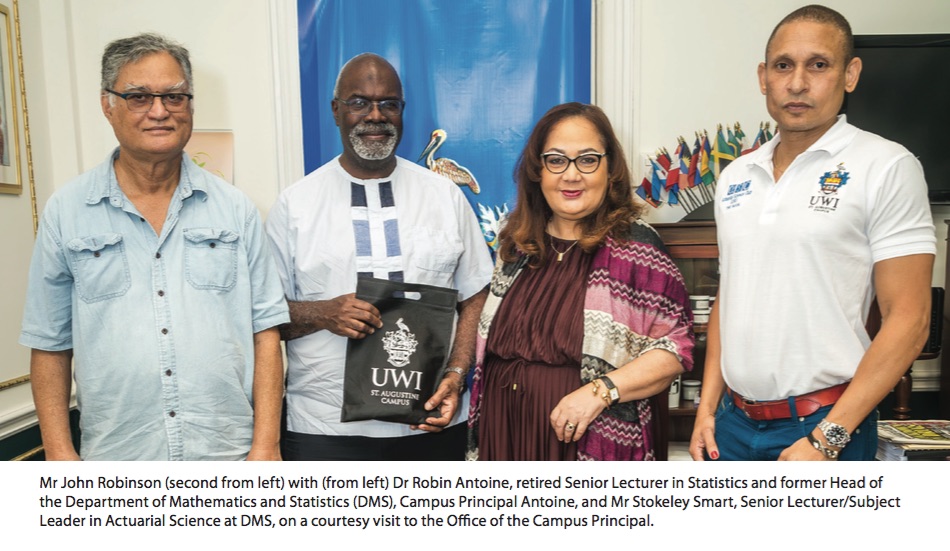While visiting Trinidad and Tobago for the 2023 Caribbean Actuarial Association (CAA) Conference (held on Nov 29 to Dec 1 at the Hyatt Regency Trinidad), Immediate Past President of the Society of Actuaries (SOA) John Robinson spoke at a seminar for aspiring actuaries at UWI St Augustine’s Noor Hassanali Auditorium on November 28.
Actuaries are commonly defined as mathematicians who use statistics to calculate premiums, dividends, or pension, insurance, and annuity rates for insurance companies.

Hosted by the UWI St Augustine Actuarial Science Club, the event attracted a broad audience which included campus students, secondary school students, and a global viewership via livestream.
Graduating from The UWI Mona Campus with a BSc in Mathematics in 1976, Robinson is the first person of colour to be SOA President, and also served as one of its board members (2013-2016). During the seminar, Robinson said his achievement only adds to the legacy of the Caribbean’s actuarial practice, which has been around for decades.
He said, “What I find, to the credit of the actuarial profession in the Caribbean, is that we’ve had actuaries in life insurance since the 1970s. It’s important for me to highlight that, because I’ve travelled the world, and there are several places – particularly in Africa – where there aren’t that many actuaries, and where some life insurance companies don’t think they need them.”
Today, Caribbean actuaries can be found practising around the world, and like Robinson, are members of prestigious actuarial societies, especially in North America and Europe. UWI St Augustine actuarial science lecturers Stokely Smart and Asad Mohammed are both members of the SOA, with Smart being a Fellow of the Society, and Mohammed an Associate.
With the region’s high vulnerability to climate change, there is a great value in having skilled actuaries with an understanding of their communities, as it can ensure livelihoods are protected with proper insurance rates, and that these comprehensive insurance considerations are also well represented in climate finance policies.
Robinson explained, “Homeowner insurance is directly affected by whether there is a hurricane or some other storm that hits someone’s home. There are a few actuaries who are beginning to develop new ways of projecting a future with climate change.” At the SOA, Robinson said, there are fellows who specialise in the analysis of mortality data – from disasters and diseases in past years – to identify trends in mortality.
Placed in the context of climate change, analysing data on climate loss and damage, for example, can help create trends to inform homeowner insurance rates and other types of insurance.
The CAA is already a member of the International Actuarial Association (IAA), an umbrella body for most of the world’s actuarial associations, and has over 200 members. The CAA’s education interests are represented on the IAA by UWI lecturer Smart. But Robinson looks forward to working with the association to further strengthen its presence and do greater outreach to raise awareness for the role of actuaries in society in hopes of inspiring future actuaries.
“I would like to see a very strong Caribbean Actuarial Association,” he said. “As I meet the current actuaries, they are all individually very strong and know what they are doing, which I hope translates to continuing to build a strong Caribbean Association.”
He added, “What we also hope is that, in places like Trinidad and Tobago and Jamaica, where there are already actuarial science programmes, those students will make their way into other fields where they can use what they have learnt to the benefit of their societies.”